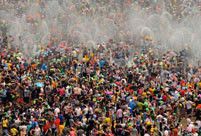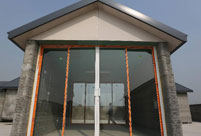 Ni Ni covers BAZAAR JEWELRY
Ni Ni covers BAZAAR JEWELRY
 Cherry blossoms reach peak bloom in Washington D.C.
Cherry blossoms reach peak bloom in Washington D.C.
 Top Chinese fashion icons in foreigners' eyes
Top Chinese fashion icons in foreigners' eyes
 Asia's largest business aviation exhibition to be held in Shanghai
Asia's largest business aviation exhibition to be held in Shanghai
 World's top-rated luxury hotels
World's top-rated luxury hotels
 Wu Jing, Xie Nan to hold wedding on May
Wu Jing, Xie Nan to hold wedding on May
 London Cake International attracts tourists
London Cake International attracts tourists
 Let's dance in harmonic Shaanxi
Let's dance in harmonic Shaanxi
 Christie's to auction dazzling diamonds
Christie's to auction dazzling diamonds
 'Model husband' shatters image of love
'Model husband' shatters image of love
In the past few years, a number of heavy metal contamination incidents have been reported across China. In May last year, excessive amounts of cadmium, a carcinogen, was detected in rice products in southern Guangzhou City. Most of the toxic rice came from central Hunan Province.
Following the incident that many believed resulted from soil contamination, Qian Guanlin, a senior national political advisor, described frequent soil pollution incidents "at a critical point", calling for an eco-oriented evaluation system and accelerated industrial restructuring and upgrade to control pollution from the sources.
COUNTERMEASURES UNDER WAY
According to the statement released by the two ministries explaining the report, the country is or will be taking "a series" of measures to better protect the soil environment and curb pollution, vowing to "uncompromisingly wage a war against land pollution."
The environment ministry is rushing to map out an anti-land pollution action plan in cooperation with other related departments, it said, citing the State Council, or China's Cabinet.
The top legislature has also given soil environment top priority in its legislative efforts, with a special group formed by the ministry responsible for drafting the law on land environment protection.
"Following a two-year effort, an initial draft has been completed," the statement said.
Meanwhile, the environment ministry is planning to launch more soil pollution surveys with joint efforts from the ministries of finance, agriculture, land resources as well as the National Health and Family Planning Commission to gather more detailed data on soil quality.
Pilot projects on soil rehabilitation will be carried out in regions that have serious soil pollution problems, and related techniques will be systematically developed and implemented in more areas.
The statement also revealed a strengthened supervision and liability-pursuing mechanism that focuses on the disposal of waste produced by heavy metal-involved industries as well as the abuse of chemical products used during agricultural production.
"Methods to collect, store, transfer and dispose of dangerous waste will be regulated to prevent secondary soil pollution," it said.
Last month, Chinese Premier Li Keqiang "declared war" against pollution in his annual government work report, and pledged to fight it with the same determination the country battled poverty.
Revising the environmental protection law, which took effect in 1989, has been deemed central to curbing pollution. However, the past three attempts to amend the law have not been successful, a rarity in China's legislation records, as unsatisfied lawmakers called for stricter measures and more government obligations.
Between April 21 to 24, the National People's Congress Standing Committee, the country's top legislature, is scheduled to review the latest revision of the law.

 Children in ancient costumes learn Zhusuan
Children in ancient costumes learn Zhusuan Tens of thousands celebrate Water Splashing Festival
Tens of thousands celebrate Water Splashing Festival A bite of China II whets the appetite
A bite of China II whets the appetite Chinese frigate completes its 14th escort mission
Chinese frigate completes its 14th escort mission Let's dance in wealthy Shaanxi
Let's dance in wealthy Shaanxi A date with 798: feel the art around you
A date with 798: feel the art around you 3D-printed houses built in Shanghai
3D-printed houses built in Shanghai World largest scale of umbrella dance
World largest scale of umbrella dance Cherry blossoms reach peak bloom in Washington D.C.
Cherry blossoms reach peak bloom in Washington D.C. The backstage of the Fashion Week
The backstage of the Fashion Week College students in Han costumes
College students in Han costumes Postgraduate works as waitress
Postgraduate works as waitress Life in a Lahu village in Yunnan
Life in a Lahu village in Yunnan An orphan’s wedding
An orphan’s wedding Hollywood documentary brings Diaoyu Islands truth to new audience
Hollywood documentary brings Diaoyu Islands truth to new audienceDay|Week|Month